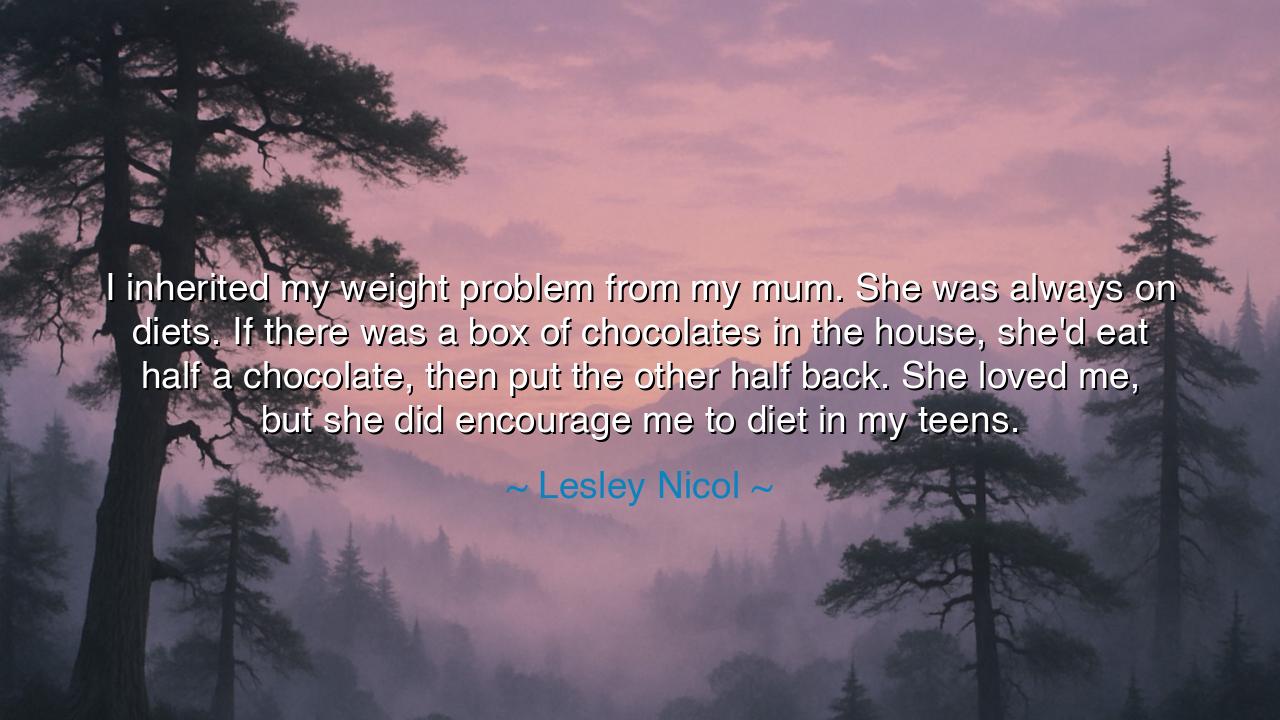
I inherited my weight problem from my mum. She was always on
I inherited my weight problem from my mum. She was always on diets. If there was a box of chocolates in the house, she'd eat half a chocolate, then put the other half back. She loved me, but she did encourage me to diet in my teens.






In the great cycle of life, where wisdom is passed down through generations like a cherished heirloom, there is an oft-ignored truth: the habits we inherit shape us in ways we may not always recognize. The story that Lesley Nicol shares with us—"I inherited my weight problem from my mum. She was always on diets. If there was a box of chocolates in the house, she'd eat half a chocolate, then put the other half back. She loved me, but she did encourage me to diet in my teens"—reveals a powerful insight into the way in which our family's actions, beliefs, and struggles shape our own journey. It is a tale as old as time, one that speaks not just of food or appearance, but of the deeper forces that bind us across generations.
In ancient times, when the great philosophers pondered the mysteries of the human condition, they often spoke of the inheritance of habits, not just through blood, but through example. The Greeks were well aware that what we witness in our early years—whether from our parents, our mentors, or our community—becomes ingrained in our very being. Socrates and Plato warned of the profound impact that upbringing and environment have on the shaping of a person’s soul. Just as the soil shapes the seed, so too does the home shape the child. Lesley Nicol’s words speak to this inheritance—not of fortune or wisdom, but of the unconscious burdens we carry from those who came before us.
Lesley Nicol speaks of her mother's constant battle with her weight, a struggle that began in the form of dieting—a word and practice that has echoed through the ages. From the earliest days of humanity, food has been a source of nourishment and a source of temptation. Ancient civilizations revered their gods with offerings of food, yet the greatest philosophers reminded their people to temper their desires and to eat not for indulgence, but for sustenance. The legendary Hippocrates, father of modern medicine, declared, “Let food be thy medicine and medicine be thy food.” And yet, the struggle with food—its pleasures, its power over us—has been a perennial one. The Romans, known for their feasts, also had a deep respect for the moderation of food and drink, understanding that it was not the quantity that mattered, but the quality of nourishment.
Lesley’s mother, caught in the cycle of dieting, is a mirror for many of us. She loved her daughter, yet she too was trapped in a culture of restriction, one that valued the control of the body over the natural rhythms of hunger and satiety. The image of her eating half a chocolate and then putting the other half back is an allegory for the futility of striving for perfection through deprivation. It speaks to the inner conflict between the soul’s desire for joy and the mind’s desire for control. The act of restricting pleasure—whether food or love—never leads to true satisfaction. The desire for indulgence always lingers, and the joy we seek remains just out of reach.
The ancient warriors, too, faced this struggle, but they understood something crucial: discipline was not the same as denial. Alexander the Great, though known for his military conquests, knew the value of maintaining strength and vitality through moderation. His soldiers were trained not just in the art of war, but in the art of living. They ate simply, but they ate well. Their bodies were temples, not prisons. They understood that only by nourishing the body and soul could they endure the hardships of battle. In this same way, we must learn to nourish our bodies without the self-imposed restrictions that our ancestors may have passed down to us.
Lesley Nicol's account of her mother's influence is a reminder to us all: patterns passed down from one generation to the next do not need to define us. The habits we inherit can be broken, transformed, and rebuilt. Though we may feel the weight of our family’s struggles, we are not bound to repeat them. The ancient wisdom speaks of self-awareness as the key to breaking the cycle. Just as the great philosopher Aristotle taught that we must know our own desires in order to master them, so too must we examine the habits we inherit, recognizing those that serve us and those that do not.
The lesson to be learned from Lesley Nicol’s reflection is one of empowerment. We are not merely the sum of the habits passed down to us; we are the authors of our own stories. Dieting, as it is often understood, is not the path to freedom, but a path to conflict with the body. Instead, let us choose to nourish our bodies with wisdom and self-love. Instead of seeking to control, let us seek to understand. Let us take responsibility for the habits we have inherited, but also the courage to change them. For it is through self-compassion, not through restriction, that we will find true health, balance, and peace.






AAdministratorAdministrator
Welcome, honored guests. Please leave a comment, we will respond soon